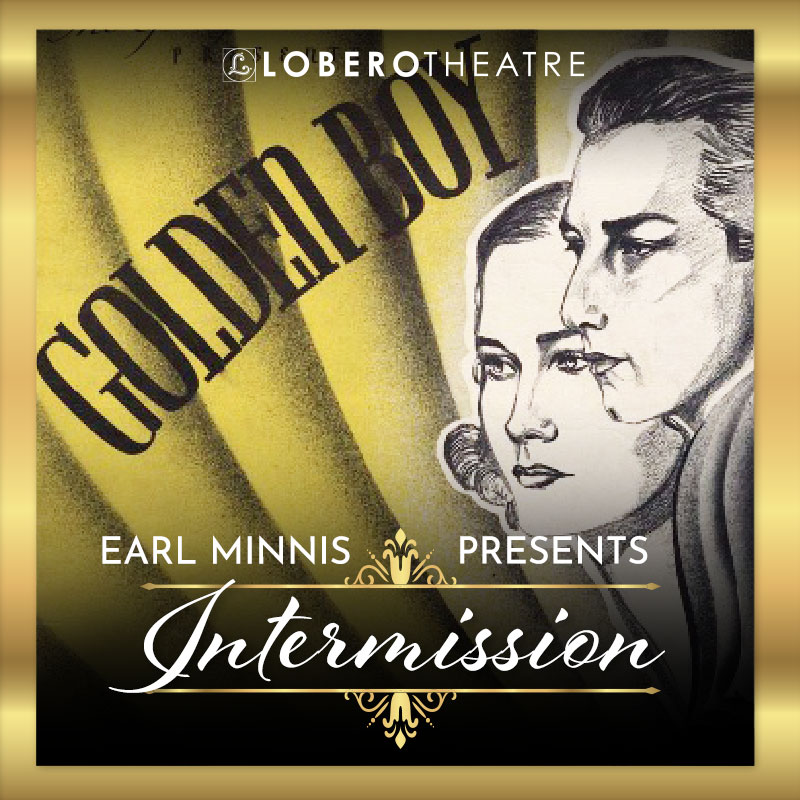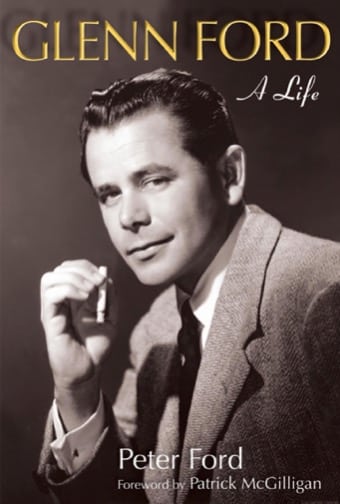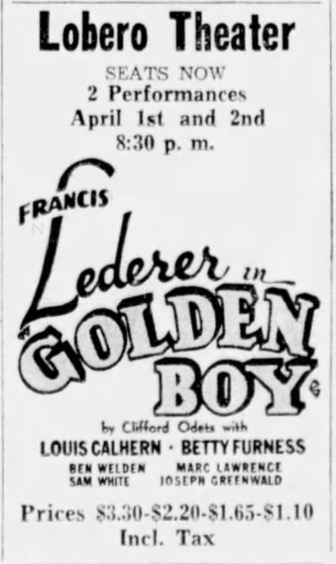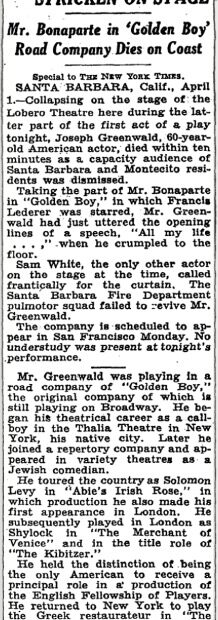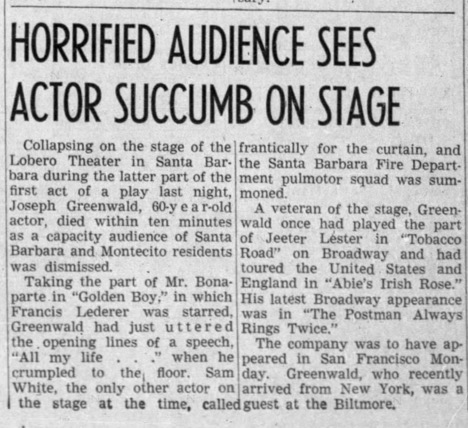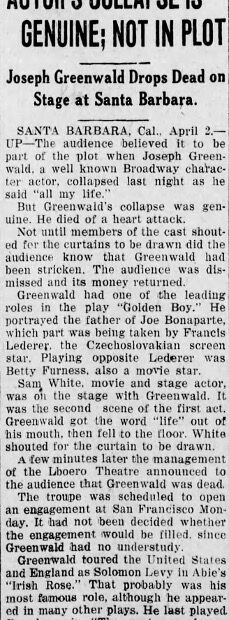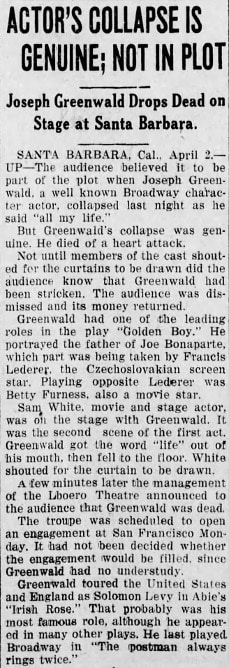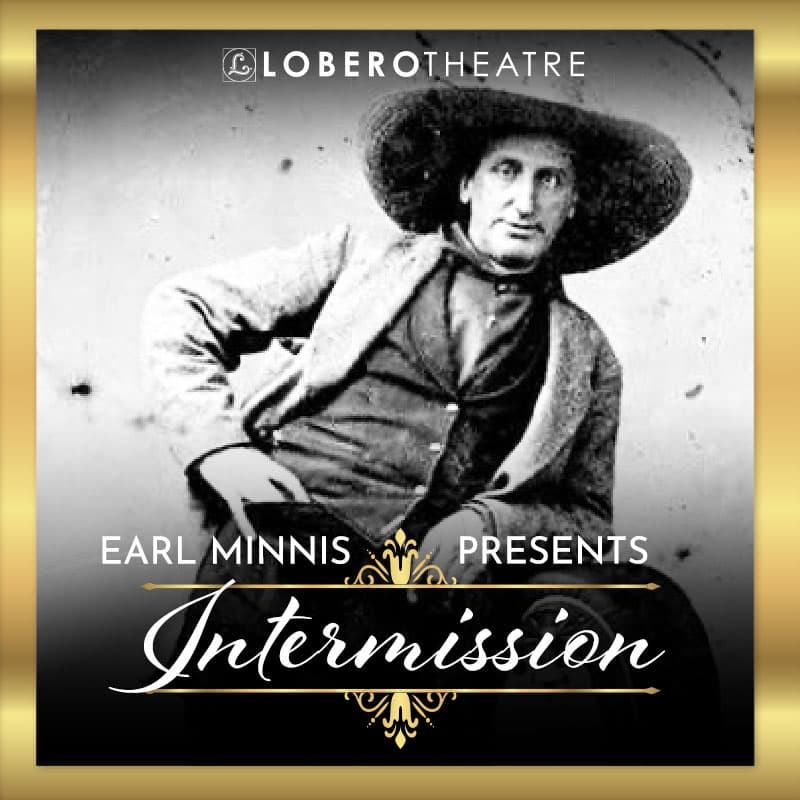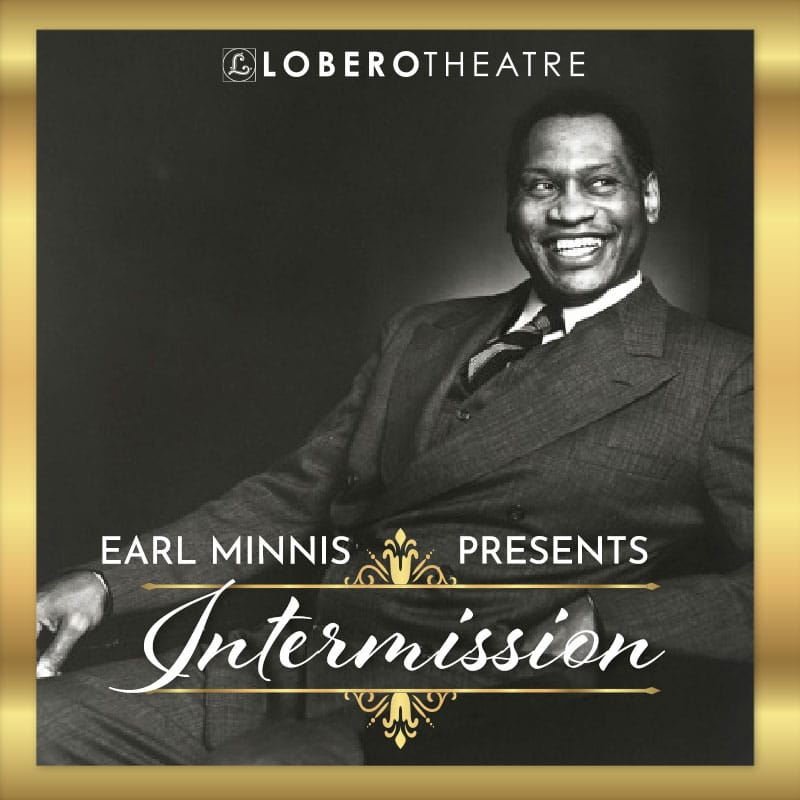Death on the stage is as old as the history of theater. The ancient Greek playwright Sophocles famously depicted the on-stage suicide of the warrior Ajax, and melodramatic death scenes were commonplace in plays in the late 1800s.
But the real thing – actors who die during a performance – are as rare as they are shocking. One of the most famous, and ironic, real-life onstage deaths occurred at the Lobero on April 1, 1938.
Joseph Greenwald was born in New York in 1878 and grew up on Manhattan’s Lower East Side. As a boy, Greenwald was so enamored with the theater that he set up his paperboy box in front of a Bowery theater just so he could meet the actors and get to know the staff.
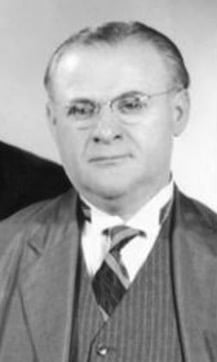
In his 30s Greenwald joined a repertory company, playing a different character each week. His salary was $25 a week and out of that, he had to buy his own wigs and costumes. In his first year as an actor, Greenwald played 38 roles. In 1926, at the age of 48, Greenwald got his first real break and joined the cast of the wildly successful comedy Abie’s Irish Rose. The play, about an Irish Catholic girl and a Jewish man who marry despite the objections of their families, was a huge commercial hit but was scorned by critics for reinforcing ethnic stereotypes. When asked to give his review of the play, Harpo Marx famously quipped, “No worse than a bad cold.”
Greenwald continued with Abie’s Irish Rose for a two-year tour of the English provinces and then stayed on to act in several shows on the London stage, including the prized role of Shylock in Shakespeare’s The Merchant of Venice. On his return to New York, he married a vaudeville comedienne named Lonnie Nace and continued with his busy career as a character actor in a number of Broadway plays.
In November 1937, the Clifford Odet play Golden Boy premiered on Broadway. Golden Boy was the story of a musically talented young Italian American named Joe Bonaparte who had to choose between his love of the violin and a lucrative, though a physically damaging career as a boxer. The play ran for 250 performances and was a financial and critical hit.
Several months after its successful Broadway run, Golden Boy was prepared for a West Coast tour. The actress – and future legendary acting teacher – Stella Adler was chosen to direct the play. Ms. Adler cast an up-and-coming young actor by the name of Francis Lederer for the play’s lead role of Joe. Joseph Greenwald was selected to play Mr. Bonaparte, Joe’s father. After several weeks of rehearsals in Los Angeles, Golden Boy was scheduled to open at the Lobero Theatre for a two-night “break-in,” before traveling to San Francisco.
Golden Boy’s West Coast premiere took place on April 1, 1938. The Lobero was sold out and the audience included a number of newspaper reporters who were eager to review the smash Broadway comedy. Working as the stage manager and minor actor (with only two lines) was the 21-year-old Glenn Ford. Ford would become one of Hollywood’s biggest stars in the 1940s and Golden Boy was only his second professional stage job. Ford recounted the night of April 1 in a biography written by his son Peter, Glenn Ford: A Life. “Actors are a very superstitious breed. So there was already a feeling of uneasiness among some in the cast. The curtain went up and everything went smoothly until the second act.”
It was at this moment in the play that Joseph Greenwald in the role of Mr. Bonaparte showed a friend an expensive violin he had just bought his son Joe.
BONAPARTE
My Joe gotta big talent. Yesterday I buy-a-him a present!
(With a dramatic flourish he brings a violin case out of the bottom part of a sideboard)
CARP (as the case is opened)
It looks like a coffin for a baby.
BONAPARTE
(looking down at violin in its case)
His teacher help me to picka him.
CARP (the connoisseur)
Fine, fine – beautiful, fine! A cultural thing!
BONAPARTE (touching it fondly)
The mosta golden present for his birthday which I give him tonight.
CARP
How much, if I’m not getting too personal, did such a violin cost you?
BONAPARTE
Twelve hundred dollars.
CARP (shocked)
What?
BONAPARTE
You’re surprised of me? I waita for this moment all my life.
After uttering the words “all my life,” Joseph Greenwald suddenly collapsed to the stage.
As reported by the national press, “The audience believed it to be part of the plot when Joseph Greenwald, a well-known Broadway character actor, collapsed last night as he said ‘all my life.’ But Greenwald’s collapse was genuine. He died of a heart attack. Not until members of the cast shouted for the curtains to be drawn did the audience know that Greenwald had been stricken.”
As Glenn Ford explained,
“I rushed onto the stage immediately. He was lying in the arms of one of the other actors. He was already dead. God, what an experience.”
The stunned audience was ushered out of the theater and their tickets were refunded. Golden Boy’s performance the following night was canceled, and the show was shut down for a week until another actor could be hired to replace Joseph Greenwald. His replacement turned out to be Lee J. Cobb, who had appeared in a different role in the Broadway production.
In 1939, Golden Boy was made into a movie starring William Holden as Joe and Lee J. Cobb as his father. In 1964, author Clifford Odets was lured out of semi-retirement and asked to write a musical version of Golden Boy specifically for Sammy Davis Jr.. And in 2013, a Broadway revival of the original play opened and was a critical hit, receiving 8 Tony Award nominations including Best Revival of a Play.
Sources
- https://www.newspapers.com
- https://timesmachine.nytimes.com/timesmachine/1938/04/02/98119092.html?pageNumber=15
- The Show Won’t Go On: The Most Shocking, Bizarre, and Historic Deaths of Performers Onstage
